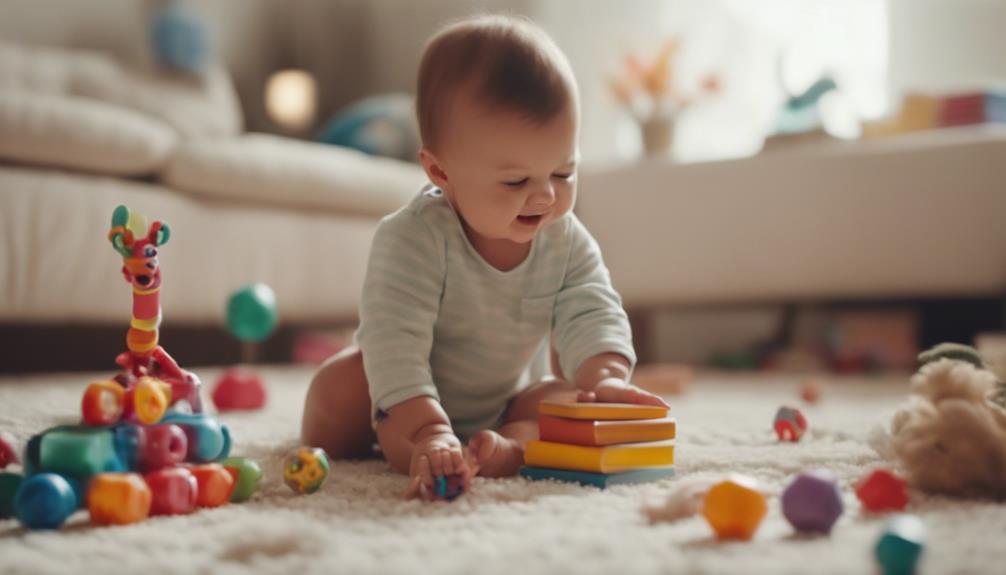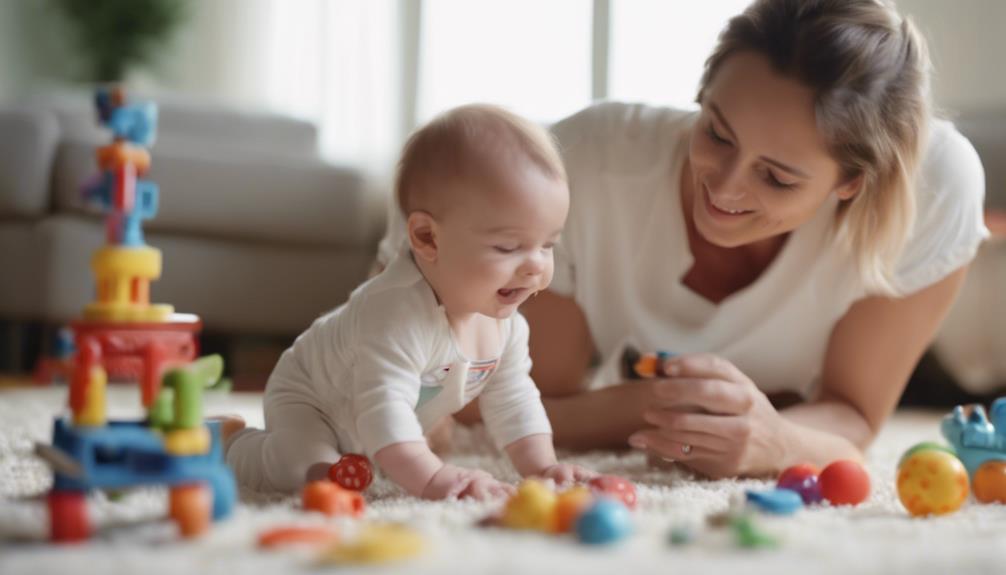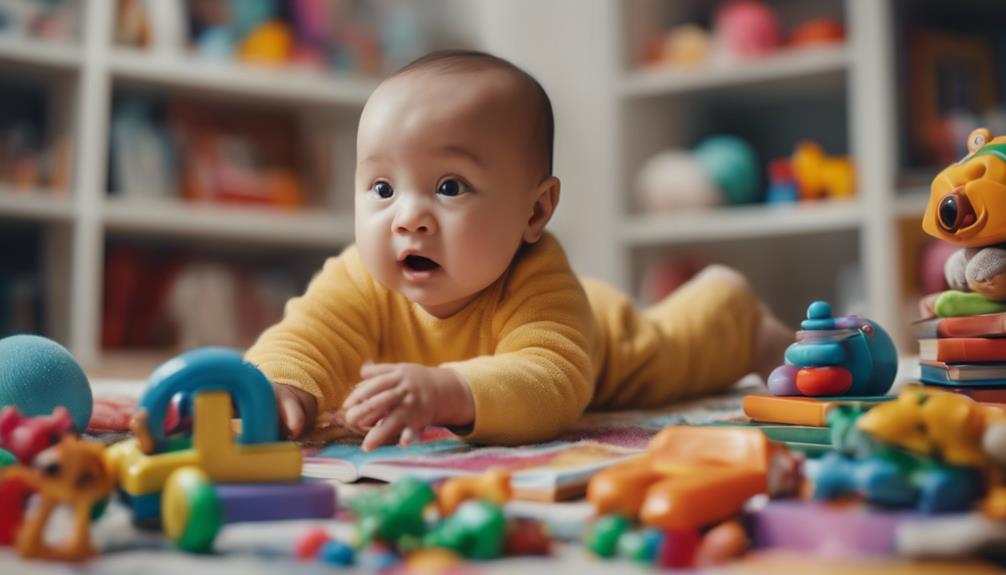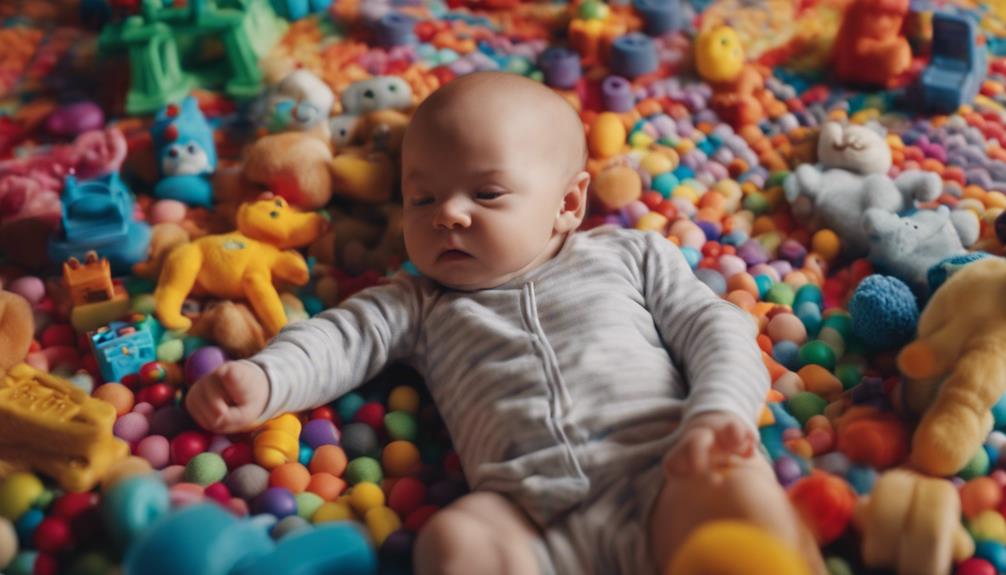To help your baby develop into a smart individual, it is important to focus on prenatal nutrition, limit screen time exposure, introduce them to music, nurture emotional intelligence, engage in play to enhance skill development, create a stimulating environment, and prioritize interaction and communication. Prenatal nutrition rich in folic acid, omega-3, iron, and vitamin D is crucial for proper brain development. Restricting TV time for children under 2 years old can prevent negative impacts on their learning abilities. Exposing children to music can enhance their cognitive growth and emotional development. Cultivating emotional intelligence through responsive care can help foster empathy in children. Engaging in interactive play with toys such as puzzles and blocks can improve cognitive skills. Providing varied sensory experiences can stimulate their senses. Effective communication and interaction can boost cognitive abilities. Stay tuned for more valuable insights.
Key Takeaways
- Provide a balanced diet rich in essential nutrients for brain development.
- Limit screen time to promote hands-on experiences and social skills.
- Expose babies to music for enhanced brain functions and cognitive growth.
- Foster emotional intelligence through responsive interactions and positive relationships.
- Engage in interactive play, cognitive development games, and varied sensory experiences.
Prenatal Nutrition and Brain Development
During pregnancy, your diet directly influences your baby's brain development, making proper nutrition essential for fostering cognitive growth.
Prenatal nutrition plays a critical role in ensuring that your baby's brain develops optimally. Essential nutrients like folic acid and omega-3 fatty acids are key components for healthy brain structure formation.
Adequate intake of nutrients such as iron and vitamin D during pregnancy supports the growth and development of your baby's brain.
To promote cognitive development in your baby, it's vital to maintain a balanced diet rich in fruits, vegetables, whole grains, and lean proteins throughout your pregnancy.
Your maternal diet has a direct impact on the development of your baby's brain, emphasizing the importance of consuming a variety of nutrient-dense foods.
Minimizing Television Exposure
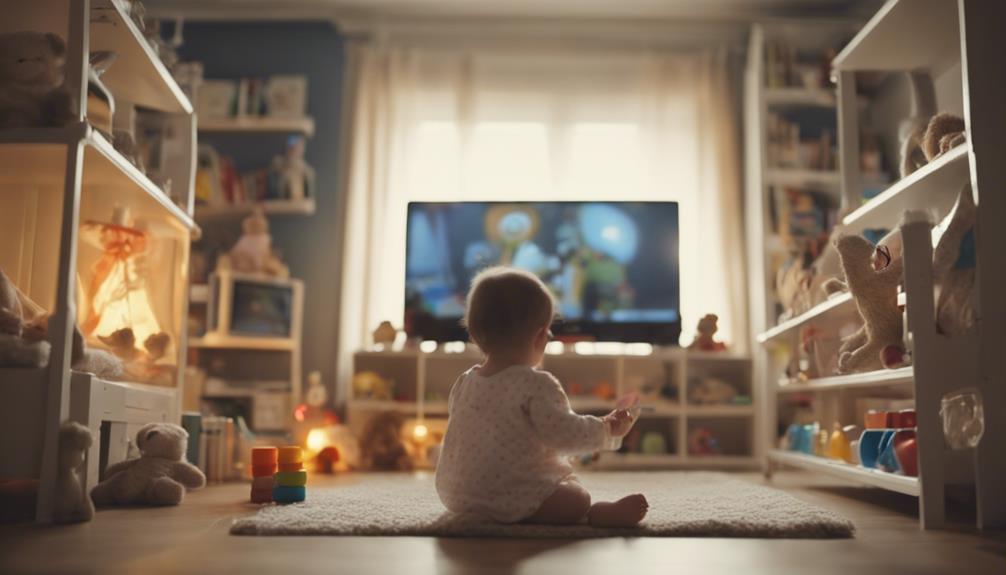
Minimizing television exposure is vital for fostering healthy cognitive development in babies. Experts recommend limiting screen time for children under 2 years old to prevent potential negative impacts on their learning and social skills. Excessive TV viewing can hinder cognitive growth and interfere with important hands-on experiences that aid in brain development.
Research has shown that babies exposed to more television tend to have lower language scores at 14 months, emphasizing the significance of prioritizing face-to-face interactions over screen time. Encouraging active play and real-life interactions can provide more meaningful learning opportunities for babies compared to passive TV watching.
Music and Cognitive Growth
Listening to music can boost your baby's brain development by stimulating brain activity and forming neural connections. Melodies can aid in memory retention, while rhythms can enhance your baby's learning process.
Music and Brain Development
Enhancing your baby's cognitive development, exposure to music from an early age can greatly impact their brain functions and overall learning abilities.
Listening to music can enhance cognitive abilities in babies, improving memory, attention, and problem-solving skills. Musical experiences stimulate multiple areas of the brain, promoting language development and emotional expression in infants.
Additionally, exposure to music early on can help babies develop a strong sense of rhythm, which is linked to better mathematical abilities later in life. Engaging in musical activities like singing, playing instruments, and dancing with babies can boost their creativity and spatial reasoning skills.
Research indicates that music has a positive impact on brain plasticity, leading to improved learning and cognitive development in babies. Incorporating music into your child's daily routine can have long-lasting benefits on their brain development and cognitive growth.
Melodies for Memory
To aid in your baby's cognitive growth, consider incorporating melodies to enhance their memory development. Listening to music can stimulate brain activity, improving memory retention and language skills in infants. Musical exposure at a young age has been linked to enhanced emotional development and social interaction skills. Singing to your baby not only aids in language acquisition but also strengthens the emotional bond between you and your little one. These musical experiences can promote creativity, problem-solving abilities, and a sense of rhythm in babies. Below is a table highlighting the benefits of melodies on memory and cognitive development in infants:
| Benefits of Melodies for Memory and Cognitive Development | |
|---|---|
| Stimulates brain activity | Enhances memory retention |
| Improves language skills | Promotes emotional development |
Introducing melodies to your baby's routine can have a profound impact on their overall development, making it a delightful way to boost their cognitive abilities.
Rhythms and Learning
Consider how introducing different rhythms to your baby's musical experiences can greatly contribute to their cognitive growth and learning abilities. Music exposure plays an essential role in enhancing brain activity among infants. When babies are exposed to music, they often exhibit improved memory, attention, and language skills. Engaging in musical activities such as singing, dancing, and playing instruments can substantially boost a baby's cognitive skills.
Varied rhythms and melodies in music can help in the development of neural connections in the baby's brain, laying a strong foundation for advanced cognitive abilities later in life. By incorporating diverse musical experiences into your baby's routine, you're fostering a stimulating environment that supports their cognitive growth.
Nurturing Emotional Intelligence

Building a strong emotional bond with your baby lays the foundation for nurturing their emotional intelligence. Responding promptly to your baby's emotional needs is crucial, as it helps them feel secure and fosters empathy. Positive parent-child interactions play a vital role in teaching children how to regulate their emotions and develop socially. Engaging in interactive play and communication aids babies in expressing and understanding emotions better. Moreover, modeling healthy relationships and conflict resolution skills can positively impact a baby's emotional intelligence. By providing a supportive and loving environment, you are setting the stage for your baby to thrive emotionally and socially.
| Key Aspects | Impact on Baby's Emotional Intelligence |
|---|---|
| Prompt response to needs | Fosters empathy and security |
| Positive parent-child interactions | Teaches emotional regulation |
| Interactive play and communication | Helps in understanding emotions |
Play for Skill Development
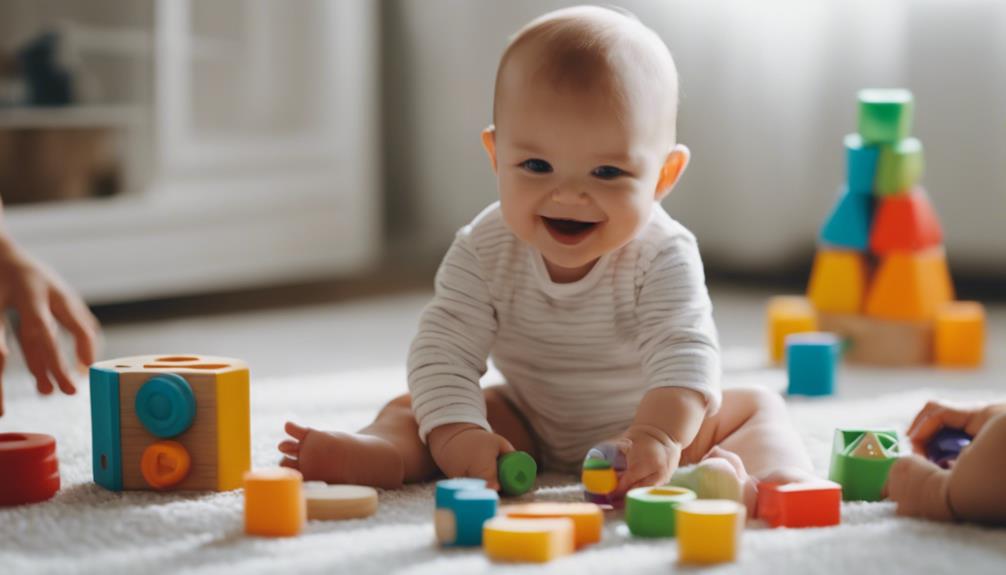
Play is essential for your baby's skill development, offering a fun way to learn and grow. Interactive toy choices, sensory exploration activities, and cognitive development games all play a role in enhancing your baby's abilities.
Through play, your little one can practice problem-solving, creativity, and communication skills, setting a strong foundation for future learning.
Interactive Toy Choices
Opt for interactive toys that promote skill development in your baby, such as shape-sorting puzzles and stacking blocks. These toys not only provide entertainment but also aid in cognitive development and problem-solving skills.
Consider the following when selecting interactive toys for your little one:
- Encourage Interaction: Choose toys that require your baby to actively engage with them, fostering social skills and communication development.
- Stimulate Multiple Senses: Opt for toys with textures, sounds, and colors to engage different senses simultaneously, enhancing sensory development.
- Teach Cause-and-Effect: Select toys that offer cause-and-effect experiences, helping your baby understand the relationship between actions and outcomes.
Sensory Exploration Activities
Engage your baby in sensory exploration activities to foster skill development and cognitive growth. Introducing different textures and fabrics to your baby helps them develop their sense of touch, promoting cognitive development.
Encouraging tactile experiences through sensory play enhances their sensory processing skills and sparks curiosity. Describing textures as your baby touches various items aids in their learning about the environment and forming brain connections.
Another fun way to engage in sensory exploration is by offering textured foods for your baby to explore. Not only does this stimulate their sense of taste, but it also engages their sensory development.
Cognitive Development Games
To enhance your baby's cognitive development, incorporate interactive games that stimulate problem-solving skills and spatial awareness. Engage in activities like peekaboo to enhance problem-solving skills, and sorting shapes to promote cognitive development.
Interactive play with puzzles and stacking blocks can help your baby develop spatial awareness and improve cognitive understanding. Playing memory games such as 'Simon Says' or 'Where's the Ball?' can enhance attention span and memory retention in babies.
Additionally, participating in activities that involve cause and effect, like rolling a ball to see it move, can foster cognitive development in your little one. Simple games like singing nursery rhymes and counting objects can also aid in developing early math and language skills.
Creating a Stimulating Environment

For essential brain development in your baby, make sure you create a stimulating environment with varied sensory experiences. Interactive play, like peekaboo and making funny faces, helps your baby learn cause-and-effect relationships.
Engaging in conversations with pauses and using silly cooing can boost language development. Remember, physical touch and closeness, such as breastfeeding or chestfeeding, play an important role in building strong bonds with your baby.
Incorporating movement and music into your daily routines can promote both physical and cognitive development in your little one. So, try incorporating activities like dancing together to lively tunes or gently swaying while singing lullabies.
These sensory experiences not only entertain your baby but also help in their overall brain development. By creating a stimulating environment filled with interactive play, language-rich conversations, physical touch, movement, and music, you're setting the stage for your baby to thrive and grow into a smart, well-rounded individual.
Importance of Interaction and Communication

Creating a stimulating environment for your baby involves fostering interaction and communication to support their overall brain development and intelligence long-term. Here are some key ways in which interaction and communication with parents can positively impact your baby's development:
- Enhanced Vocabularies: Regular communication with your baby, such as talking, singing, and reading, can lead to larger vocabularies and improved language skills, setting a strong foundation for future learning.
- Improved Cognitive Abilities: Encouraging eye contact and engaging in face-to-face interactions with your baby can boost their social and cognitive development, helping them understand emotions and navigate social interactions effectively.
- Support for Brain Development: Narrating daily activities and pointing out objects to your baby not only fosters language skills but also promotes joint attention, which is essential for language development and overall cognitive growth.
Frequently Asked Questions
How Do You Raise a Super Smart Baby?
To raise a super smart baby, engage in interactive play, create a nurturing environment, encourage exploration, read regularly, and prioritize emotional connection. These actions stimulate brain development, enhance cognitive growth, boost language skills, and support overall development.
How Can I Increase My Baby's Iq?
To boost your baby's IQ, focus on breastfeeding for at least a year, limit TV exposure, and invest in music training. Create a loving, stimulating environment as caregivers and surroundings have a substantial impact on intelligence development and potential.
How to Conceive a High IQ Baby?
You can't guarantee a high IQ baby like you can't predict the weather. But, like tending a garden, nourish yourself with a balanced diet and care during pregnancy. Stimulate your mind and body for your baby's potential.
How Do I Make Sure My Baby Is Born Smart?
Want to guarantee your baby is born smart? Prioritize proper prenatal care, including a balanced diet and avoiding harmful substances. Read aloud during pregnancy, maintain good nutrition, engage in physical activity, and manage stress for peak brain development.
Conclusion
Now that you have all the expert tips for raising a smart baby, it's time to put them into action. Remember, every little interaction and activity can make a big difference in your child's development.
Stay consistent and patient, and watch as your baby grows into a curious, intelligent individual.
The journey of nurturing a smart baby is just beginning, so embrace each moment and enjoy the journey ahead!

